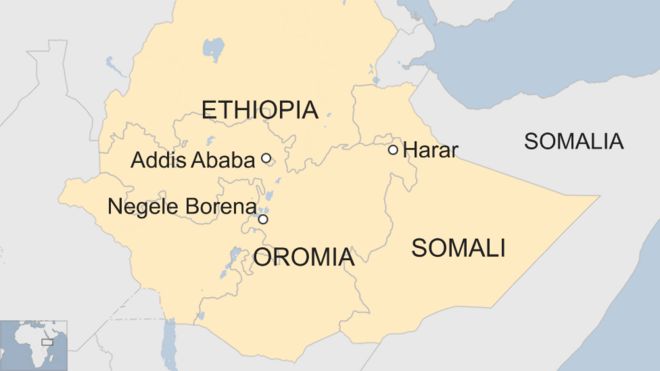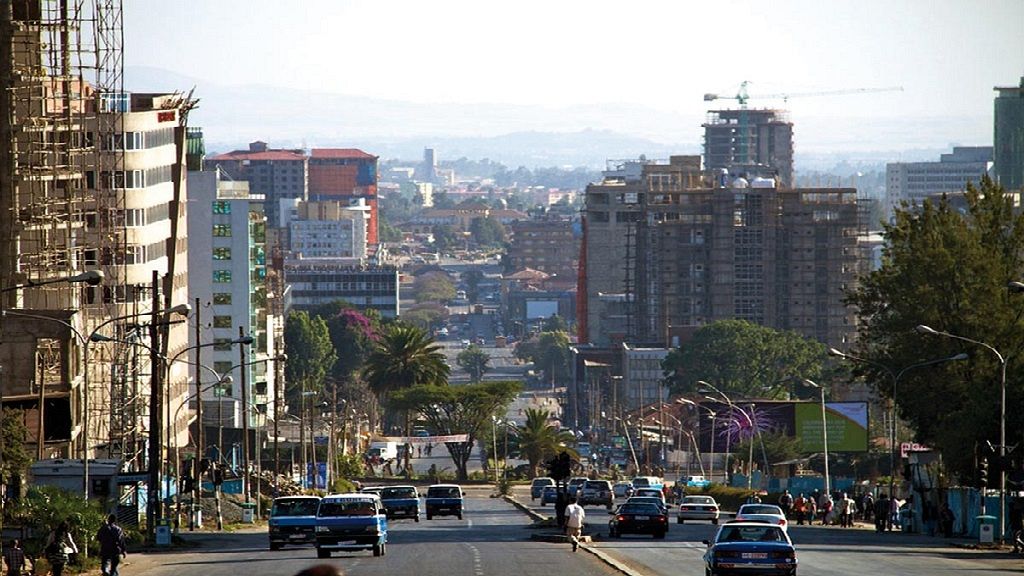- 3 hours ago

EPRDF regime's self image of ethnically Balkanized Ethiopia, established by late Dictator Melese Zenawie. Freedom of Press is Dead in ethnocracy based irridentism. Fertile land is grabbed by foreign speculators, over 5 million are starving. 500'000 kids are on the streets. Millions are displaced by force. The regime is arming proxy warriors. Dams are built wantonly risking the existence of millions of indigenous people. Eritreans Moles are Ruling even after seceding in 1991.
Translate
Monday, December 18, 2017
European Union document outlines procedure to expel Ethiopians and protest in Sweden
 xxxxxxxxxxxxxxxxxx
xxxxxxxxxxxxxxxxxx
The document below has been leaked. It is still in draft form, but it indicates that the EU and Ethiopia are close to signing a deal to ensure that Ethiopians who have not been granted refugee status can be forcibly returned to Ethiopia.
Martin

In view of the meeting of the Working Party on Integration, Migration and Expulsion on 6 December 2017, delegations will find attached the above draft EU admission procedure.
ANNEX
DRAFT ADMISSION PROCEDURES FOR THE RETURN OF ETHIOPIANS
FROM EUROPEAN UNION MEMBER STATES
FROM EUROPEAN UNION MEMBER STATES
The Government of the Federal Democratic Republic of Ethiopia and the European Union (EU) agreed on the Admission Procedure applicable only for Ethiopian nationals who are illegally present in the EU Member States (EUMS).[1]
This Procedure will be applied to voluntary and non-voluntary returns in full compliance with the human rights of Ethiopian nationals provided under relevant international instruments.
Section 1: General Provision
- This Admission Procedure is not an international agreement and is not intended to create legal rights or obligations under domestic or international law.
- This Admission Procedure shall apply only to Ethiopians who are determined by the competent authority of an EUMS not to fulfil or no longer fulfil the conditions for entry, stay or residence in that EUMS.
Section 2: Required Travel documents
The following shall constitute valid travel document within this framework
- Valid Ethiopian passport, or
- Laissez-passer issued by the Government of Ethiopia
Section 3: Issuance of Laissez-passer
- Upon application by the authorities of an EUMS, the Ethiopian Consulate will issue a laissez-passer for an individual who possesses an expired machine readable Ethiopian Passport within three (3) working days from the date of application by a EUMS when the recipient is in the EUMS where the Consulate is located. When it is applicable, laissez-passer will be issued within eight (8) working days when time is needed for a consular officer to travel to another EUMS.
- The application referred under Paragraph 1 of this Section will include a declaration ensuring that a return order/decision has been issued in accordance with the domestic law of the EUMS.
- Where the individual possesses no valid or expired machine readable passport, the following paragraphs will apply:
- The EUMS will provide information and evidence on the nationality of the individual to the Ministry of Foreign Affairs of the Federal Democratic republic of Ethiopia (MFA).
- The information and evidence referred under ‘paragraph 3(a)’ are data retrieved from the EU Visa Information System (VIS) including passport number, name and other information; or ID Card, birth certificate or a drivers’ license the individual possesses.
- MFA (the headquarters) will transmit the information and evidence to the Ethiopian National Intelligence and Security Services (NISS).
- NISS will examine the documents for veracity and communicate its decision to the MFA.
- The outcome of the verification process will be communicated to the EUMS and the Ethiopian Consulate responsible for the EUMS concerned within fifteen (15) working days from receiving the communication under ‘paragraph 3(a)’.
- The Ethiopian Consulate in or responsible for the concerned EUMS will issue the Laissez-passer within three (3) working days from receiving the communication under ‘paragraph 3(e)’ and other required documents. When it is applicable, the laissez-passer will be issued within eight (8) working days when time is needed for a consular officer to travel to another EUMS.
- Where the individual possesses no valid or expired machine readable passport and there is no information provided under Section 2, paragraph 3(b) of this Procedure, the following paragraphs will apply:
- Ethiopian nationality will be determined by NISS.
- The EUMS that has a reason to believe an individual is of Ethiopian nationality may file a request for nationality determination interview by the Ethiopian Consulate in its territory or the Consulate accredited to it.
- The interview will be conducted within fifteen (15) working days from receiving the request under ‘paragraph 4(b)’.
- Upon the request of an EUMS, interviews may be conducted by a dedicated mission from Ethiopia, the costs of which would be fully covered by that EUMS, in charge of identifying Ethiopian nationals.
- If the outcome of the interview is not conclusive and some additional verification of nationality in Ethiopia is needed, NISS carries out the necessary checks and informs the EUMS on the outcome within thirty (30) calendar days.
- Individuals identified as Ethiopian nationals in the process of identification will be issued Laissez-passer within three (3) working days. When it is applicable, laissez-passer will be issued within eight (8) working days when time is needed for a consular officer to travel to another EUMS.
- In the case where an individual is determined not to be an Ethiopian national the outcome of the process of identification will be communicated to the EUMS in writing.
Section 4: Travel Documents
- Laissez-passer will be of single use and valid for up to six (6) months.
- Replacement of an expired Laissez-passer will be issued within three (3) working days upon return of the expired Laissez-passer.
- Ethiopia will receive individuals returned within this Procedure upon the receipt of communication from the EUMS on the details of scheduled or dedicated flights for transfer, with all costs of such transfers borne by the EUMS.
Section 5: Post Admission
- The EU has expressed its commitment to support the Ethiopian authorities in the reintegration of Ethiopians returned within this Procedure through appropriate dedicated projects.
- A working group involving representatives from both sides, meeting regularly and at least every six months will monitor and discuss implementation of the process established by this document, including with regards to travel documents.
Section 6: Final Provisions
- This Procedure will start to apply upon exchange of a note verbale between the EU Delegation and the MFA indicating their agreement on the content.
- The date of receipt of the later note verbale will be the date of first application.
- The EU or the Government of Ethiopia may at any time request to modify this Procedure.
- Any change will be subject to the written mutual consent of the EU and the Government of Ethiopia accepting the change.
[1] Taking account of the close relationship between the European Union and Iceland, Liechtenstein, Norway and Switzerland (Schengen Associated Countries), Ethiopia may seek the consent of the relevant Schengen Associated Country to apply this Procedure also to for Ethiopian nationals who are illegally present in that Country.
Share this:
Dozens die in clash between Ethiopian Somalis and Oromos - BBC News

At least 61 people have been killed in clashes between different ethnic groups in Ethiopia's Oromia region since Thursday, officials said.
It is not clear what caused the latest violence between ethnic Somalis and Oromos.
But it comes after soldiers shot dead 16 ethnic Oromos at a protest on Tuesday, reports Reuters news agency.
Ethiopia's Oromia and Somali regions share a long internal border and in the past have fought over grazing land.
Oromia government's spokesperson, Adisu Arega, announced the deaths on his Facebook page.
He said 29 ethnic Oromos were killed between 14 and 17 December and 32 ethnic Somali Ethiopians were killed in revenge attacks.
He added that the clashes happened in the region's Hawi Gudina and Daro Lebu districts.

What is behind the long-running conflict?
Oromia and Somali are, respectively, the two largest regions in the country by area size. Oromos are Ethiopia's biggest ethnic group - making up about a third of Ethiopia's population while Ethiopian Somalis make up just 6% of the population.
Historically, the relationship between Somalis and Oromos has been characterised by territorial competition which often leads to disputes over resources, including wells and grazing land.
These conflicts can cause the displacement of tens of thousands of people.
In 2004, a referendum to decide on the fate of more than 420 kebeles - the country's smallest administrative unit - gave 80% of them to Oromia.
Following the outcome, tens of thousands of ethnic Somalis reportedly fled the areas for fear of repercussions.
The decision has still not been implemented and this is one factor behind the current conflict.
Saturday, December 9, 2017
Ethiopia travel alert after killing of German tourist in Afar region_ Africa news
U.K. reviews

Abdur Rahman Alfa Shaban
with REUTERS
Ethiopia
The United Kingdom on Tuesday December 5, reviewed its travel advice to citizens in Ethiopia citing the killing of a German tourist last Sunday (December 3.) They disclosed that security presence had been increased in the area where the incident took place.
The Ethiopian government on Tuesday confirmed the death of a German tourists whiles his Ethiopian tour guide also sustained injuries. Addis Ababa said a probe was underway to ascertain the circumstances around the incident.
“The perpetrators of the attack are being sought by security forces,” Information Minister Negeri Lencho told Reuters.
There is now an increased military and police presence in the area; travel may be disrupted and entry to some sites may be prohibited at short notice.
The U.K. travel alert was categorized in the area of ‘Safety and security’ and read as follows: “On 3 December 2017, a German tourist was shot and killed in an Ethiopian guide shot and wounded while sightseeing at Erta Ale, in the Danakil area of the Afar region of north-east Ethiopia.
“There is now an increased military and police presence in the area; travel may be disrupted and entry to some sites may be prohibited at short notice; if you’re in the area, exercise caution and follow the advice of the local authorities.
“You should only travel to this area with a recognised tour company – such tours are normally supported by an armed police or military escort,” it concluded.
The Afar province which borders Eritrea has long been prone to banditry and separatist rebels have operated there. Addis Ababa has said the rebels are backed by its northern neighbour, with whom it is at odds over an unresolved border dispute.
Five European tourists were killed and two others kidnapped alongside two Ethiopians in the same region in 2012, in an incident claimed by a group that has carried out sporadic attacks for over a decade.
The Afar Revolutionary Democratic Unity Front (ARDUF) has fought a low-key insurgency to carve out a homeland from Ethiopia, Eritrea and Djibouti.
Five years earlier, another five Europeans were kidnapped in the province – a barren, searingly hot corner of the Horn of Africa country where rocky hills rise above vast deserts below sea level.
A German tourist was shot and killed in northeastern Ethiopia stratfor.com/
A German tourist was shot and killed in northeastern Ethiopia while visiting the Erta Ale volcano, BBC News reported Dec. 5. It remains unclear who conducted the attack and the government is investigating the incident. In 2012, five tourists were killed and four others were abducted in the same area, with the Afar Revolutionary Democratic Unity Front claiming responsibility for the attack. Ethiopia has long been one of the most stable and influential countries in East Africa.
Subscribe to:
Comments (Atom)